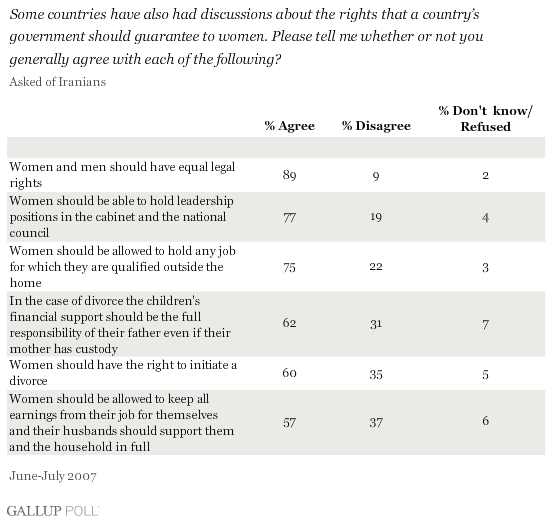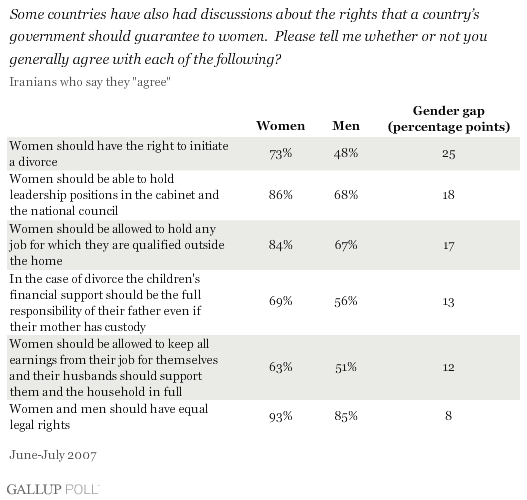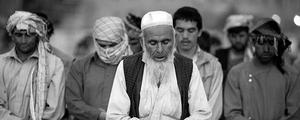WASHINGTON, D.C. -- The attention women's rights have received during Iran's presidential campaign has galvanized the country's electorate ahead of this Friday's election. Gallup Polls in Iran suggest the focus may have tapped into an undercurrent of support that was evident even in 2007, when majorities of Iranians agreed the government should guarantee women certain rights.

Iran's economic problems will likely weigh most heavily on voters' minds on Election Day, but women's rights issues may still factor into their decisions. Incumbent President Mahmoud Ahmadinejad's challengers have actively courted voters with pledges to review discriminatory or unfair laws, select women for decision-making roles in government, and cancel the quotas that limit women's enrollment at universities.
When Gallup polled Iranians in 2007, majorities of respondents supported rights for women in all situations they were asked about, including several that have attracted attention in this election. Nearly 9 in 10 Iranians (89%) agreed that, in general, women should be guaranteed the same legal rights as men, and at least three in four agreed women should be allowed to hold leadership positions in the cabinet and national council (77%) and hold any job outside the home they are qualified for (75%).
With the exception of women's right to initiate divorce (which less than half of Iranian men agreed should be guaranteed), majorities of Iranian women and men supported all rights tested. However, women were more likely than men to agree on every issue.

Iranians' views on these issues are not unique. Gallup has observed similar gender patterns elsewhere in the Middle East and North Africa.
The largest gaps between Iranian men and women appeared on the issues of women's right to initiate divorce (25 percentage points), their ability to hold leadership positions in the cabinet or national council (18 points), and to hold any job outside the home that they are qualified for (17 points). Men and women most closely aligned on the issues of women being allowed to drive a car and having the same legal rights as men, but in both cases, the difference was still eight points.
Aside from gender differences in Iranians' responses to these questions, there were few interesting differences in other demographic groups. Contrary to what one might anticipate, there were also few differences between urban and rural Iranians' views. Urban Iranians were only slightly more likely than rural Iranians to agree that women should hold leadership positions and hold any job outside the home they are qualified for, but again, substantial majorities (at least 7 in 10 respondents) supported these freedoms for women.
Bottom Line
The Gallup Poll of Iran conducted in 2007 shows that even then, support for women's freedoms was palpable. While these data do not necessarily reflect attitudes toward women's rights in the current election context, they do suggest that candidates' promises along the campaign trail may have resonated with many Iranian voters -- not just Iranian women. And even if this election doesn't bring about changes in women's status, then the attention and emphasis women's rights received will have set precedent for the next election.
Survey Methods
Results are based on face-to-face interviews with 1,004 adults, aged 15 and older, conducted in June and July 2007 in Iran. For results based on the total sample of national adults, one can say with 95% confidence that the maximum margin of sampling error is ±3.3 percentage points. The margin of error reflects the influence of data weighting. In addition to sampling error, question wording and practical difficulties in conducting surveys can introduce error or bias into the findings of public opinion polls.
